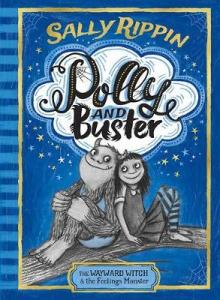 The second book in the Polly and Buster series has just come out, and it’s given me a reason to go discover the first book properly, sitting on my endless to-be-read pile looking ever so lovely with its hardback cover in blue (absolutely my favourite colour.) I’d had a go at reading it before out loud to my six-year-old, but she didn’t really have the focus for a longer chapter book yet (very sad as I’m itching to start reading all the scariest Roald Dahl books, and the first Harry Potter, and War & Peace, and…well, maybe not.)
The second book in the Polly and Buster series has just come out, and it’s given me a reason to go discover the first book properly, sitting on my endless to-be-read pile looking ever so lovely with its hardback cover in blue (absolutely my favourite colour.) I’d had a go at reading it before out loud to my six-year-old, but she didn’t really have the focus for a longer chapter book yet (very sad as I’m itching to start reading all the scariest Roald Dahl books, and the first Harry Potter, and War & Peace, and…well, maybe not.)
Polly is a witch, but not a super good one–she tries hard, but the words of the spells go all higgledy-piggledly and it’s easy to mess them up. It’s hard for her to fit in at school when her spells keep going so wrong, and that makes her sad – but she always has Buster, her very best friend, her next-door-neighbour, and a monster. In Polly’s world, though, monsters aren’t treated very well. Most witches and warlocks think that monsters are greasy and dirty (well, that part’s true) and bad and wrong (which is absolutely not true), and some of them want monsters gone altogether. This means that Polly and Buster have to keep their friendship a secret, no matter how important it is to both of them. But when Polly does something so unexpected that it changes everything, making everyone want to be her friend, it seems like the thing she’s always wanted, until she realises that to get there, she has to push away her friendship with Buster. Can Polly bring herself to do something like that to the friends that she loves?
This is a very sweet, but also quite serious book, with lots of pictures, some sparky adventures, and words that are big and vibrant when they need to be, making it feel like you are really there in every moment. It can be sad–really sad–like when Polly thinks about how her dad has died, and her sister is now awful, and her mother only feeds her healthy stuff like worms. (Which was the moment I realised I maybe didn’t want to be a witch after all. Worms! No thank you very much.) It’s also a little bit political, talking about the lines that separate witches and monsters, and that’s really good, because a lot of kids books don’t really tackle that type of thing, since it’s so hard. (And hard for adults to think about too.) It’s also very warm and cosy, when there are hugs and cakes and people who care. And that’s really the point of the book–there are always people who care. You just have to know who they are.
“There are people who care”. I love this and I am stealing this ❤️❤️
LikeLike